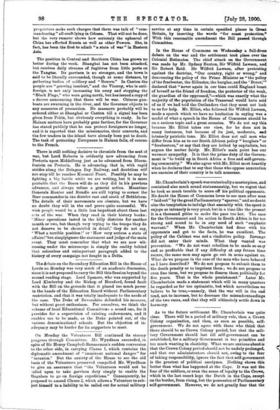Mr. Chamberlain's speech was oratorically a masterpiece, and contained also
much sound statesmanship, but we regret that he took so much trouble to score off his political opponents. No doubt the House of Commons loves to see man after man "laid out" by the great Parliamentary " sparrer," and no doubt also the temptation to indulge that assembly with the sport it enjoys so intensely is very great, but in a time like the present it is a thousand pities to make the pace too hot. The case for the Government and its action in South Africa is far too strong and sound to be in any need of such "emphatic warrant." When Mr. Chamberlain had done with his opponents and got to the facts, he was excellent. The policy of the Cabinet was not a vindictive policy. Revenge did not enter their minds. What they wanted was prevention. "We do not want rebellion to be made so easy and so profitable that if any difficulty at any future time recurs, the same men may again go out in arms against us. What do we propose in the case of the men who have behaved as I have described? We do not propose to submit them to the death penalty or to imprison them ; we do not propose to even fine them, but we propose to disarm them politically for five years. That is the whole punishment." Later Mr. Chamberlain made a statement which will in many quarters be regarded as far too optimistic, but which nevertheless we believe to be true,—namely, that the war will in the end tend, not to increase, but to decrease the misunderstandings of the two races, and that they will ultimately settle down in harmony.


































 Previous page
Previous page